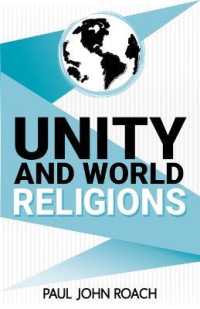- ホーム
- > 洋書
- > 英文書
- > Religion / Ethics
Full Description
Theology is a rational endeavor to understand everything about God, from within a faith tradition and its scriptures, and in response to problems posed by the conditions of a particular time and place. God in Islamic Theology: Tawhid in Classical Islamic Theology and Said Nursi's Risale-i Nur engages and gleans classical and contemporary understandings on the central tenets of God in Islam. The book makes a substantive contribution to Islamic Studies in four main ways. First, it grasps and justifies the use of the language and genre of theology in relation to scholarly efforts to relate Qur'anic teachings about God to human understanding. The development of Islamic theology and its evolving scope are explored to produce a fresh framework in the study of Islamic theology. Second, it directly addresses some of the challenges facing Islam, including its multi-layered theological positions and how these influence its internal coherence and its external relations, especially with Abrahamic faith traditions and Western philosophy generally. Third, presenting a new understanding of Islamic epistemology, it drives to the prime essential of Islamic theology in its attempting to prove the existence, oneness, and relatability of God. Fourth, it highlights and justifies the place of Said Nursi as an informed and theologically rigorous contemporary source in Islamic theology.
Contents
Introduction
Chapter One: Defining Islamic Theology and the Theologian's Tension
Chapter Two: Modern Theological Islamic Revival
Chapter Three: Islamic Epistemology and Nursi's Thought
Chapter Four: Existence of God
Chapter Five: Taw?id—The Oneness of God
Chapter Six: Ma'rifat Allah—Knowing and Relating to God
Conclusion
Bibliography
About the Author







